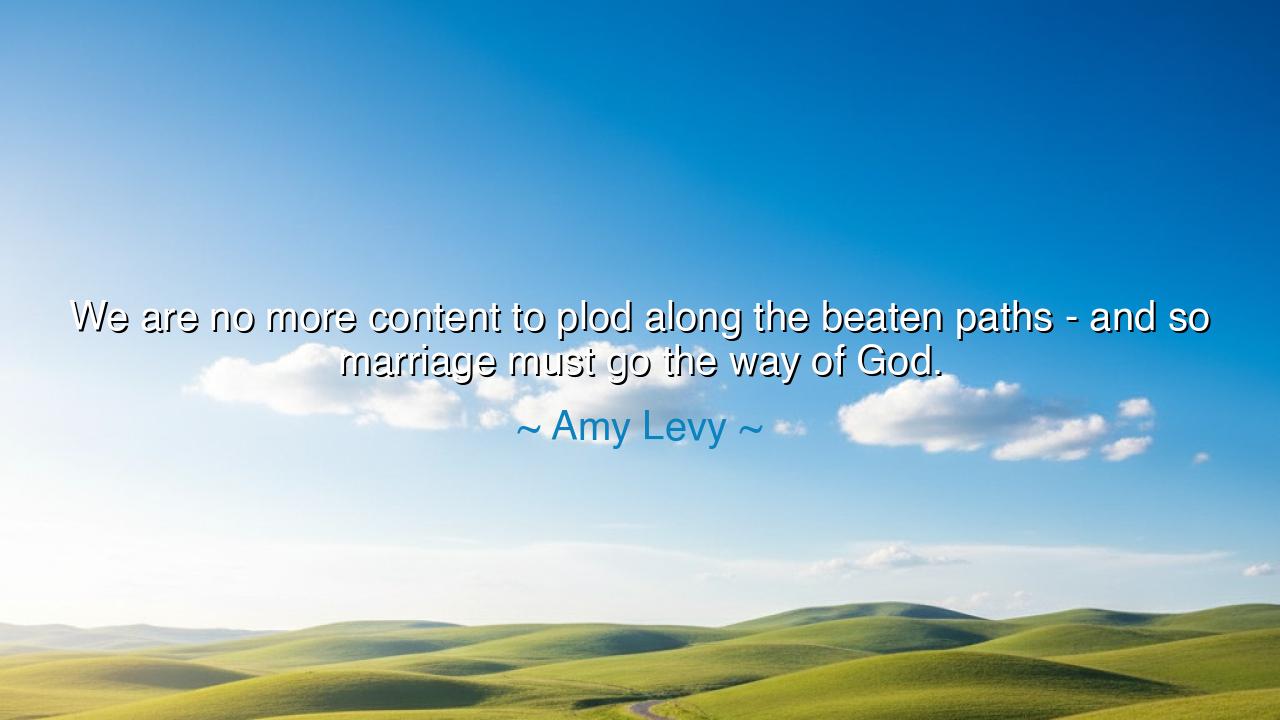
We are no more content to plod along the beaten paths - and so
We are no more content to plod along the beaten paths - and so marriage must go the way of God.






"We are no more content to plod along the beaten paths - and so marriage must go the way of God." These profound words by Amy Levy speak to the restless spirit of those who are no longer content with the conventional, with the path most traveled. In her statement, Levy suggests that marriage—as it has traditionally been understood—no longer holds the same meaning or purpose for a new generation of thinkers, artists, and rebels. She proposes a radical shift, implying that if marriage is to endure, it must evolve beyond the rigid societal norms and instead align with a higher, spiritual calling. It must reflect the true, divine nature of human connection, free from the constraints of tradition and superficial expectations.
In the ancient world, the institution of marriage was steeped in duty, societal role, and legacy. For the Romans, marriage was not primarily about love or personal fulfillment, but about securing political alliances, securing property, and continuing bloodlines. The ancient Greeks, while celebrating love in its many forms, also viewed marriage as a civic duty, often intertwined with the needs of the community. Aristotle, in his musings on marriage, suggested that it was a partnership of mutual benefit, rather than a spiritual or romantic union. Levy’s words, though, reject this cold, utilitarian view of marriage. She calls for a transformation, one that is not bound by societal expectation, but inspired by a higher, more authentic and divine connection.
It is within this context that we must understand Levy’s call. She yearns for marriage to be something more than a social contract or a tradition—it must be an elevated connection, grounded in purpose and love that transcends mere obligation. Marriage, in Levy’s eyes, must be a reflection of spirituality—a union not bound by social convention, but one that is guided by the most sacred truths of humanity and the divine. This idea echoes the stories of great historical figures who, at critical moments, broke free from the chains of societal norms to forge their own paths in the name of love and connection.
Consider, for example, the French Revolution, a time of radical change, when thinkers and revolutionaries questioned all societal structures, including marriage. Olympe de Gouges, a feminist and activist of the time, fought for the rights of women and their independence, proposing that marriage be redefined to reflect a more egalitarian and freedom-based understanding. She argued that marriage should be based on equality, mutual respect, and true love—not merely a legal contract to uphold family and property. Much like Levy, de Gouges believed that marriage could no longer simply follow the "beaten path" of tradition. It needed to evolve and reflect the true essence of individual rights and spiritual unity.
Levy’s plea to let marriage go the way of God is a demand for transcendence, a call for spiritual awakening. God, in this context, can be understood as the ultimate source of truth, a force that transcends human conventions and is imbued with pure, unconditional love. If marriage is to have any lasting value, it must be aligned with this higher truth, reflecting not just societal expectations, but the true connection that exists between two souls bound by love and respect. It is in this light that Levy’s message becomes a revolutionary one—calling for the liberation of the institution of marriage from the constraints of tradition and aligning it with something far more profound.
In the modern world, where marriage has often been reduced to a series of legal contracts and social obligations, Amy Levy’s words carry a timeless wisdom. Marriage should not be reduced to a mere ritual, something to be followed because society says so, but should be seen as a spiritual and emotional commitment that serves to uplift and inspire both partners. It is a sacred union that must be nurtured with care, respect, and an ongoing commitment to mutual growth, rooted in love, trust, and equality. Levy’s radical shift in perspective is a call for us to reimagine marriage in the 21st century as an evolving, dynamic bond—one that transcends the outdated norms of the past and becomes a force for personal and collective transformation.
The lesson we must take from Amy Levy’s reflection is clear: marriage is not merely a societal expectation, but a choice—one that should be based on deeper, more meaningful principles. Whether you are in a marriage or considering entering one, ask yourself: what is the deeper purpose of this connection? Does it reflect my truest values? Is it founded on equality, respect, and love, or is it simply following the path that others have set before me? Like Levy, we must be unafraid to challenge the societal norms that confine us, reimagining what marriage can be and what it truly means. By doing so, we can create a future where marriage is not a burden, but a celebration of true human connection and spiritual unity.
Let us move forward with this wisdom in our hearts: to embrace the call for a new definition of marriage, one that speaks to the deepest truths of our being, elevates our connections, and aligns with the divine principles of love, respect, and equality. Just as the great thinkers of the past have challenged us to see beyond the confines of tradition, so too must we move forward with the courage to reshape marriage into a force that binds us not out of obligation, but through a true, mutual commitment to one another’s well-being and growth. Let marriage go the way of God, as Levy suggests—let it be rooted in love, enlightened by truth, and strengthened by the bonds that unite us all as humans, seeking something greater than ourselves.






AAdministratorAdministrator
Welcome, honored guests. Please leave a comment, we will respond soon